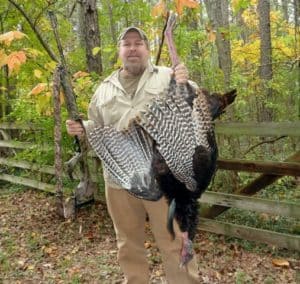By Bill Cooper
Sometimes an Eastern wild turkey gobbler can be as hard to get as pulling hens’ teeth. Renowned turkey hunter Ray Eye learned, through decades of turkey hunting, how to consistently kill wild turkeys under the toughest conditions.

Turkey hunting expert Ray Eye believes calling, while sounding authentically like a wild turkey, is by far the key to killing more gobblers.
I have enjoyed experiencing Ray Eye’s turkey hunting camps on many occasions over the last three decades. To say that Eye is an incredible turkey hunter is a gross understatement. Those of us who follow him closely are no less amazed at his continued success today than we were when we first met him 30 years ago.
In his newly released book, “The Turkey Hunter’s Bible,” Eye reveals his secrets as a professional turkey hunter. To have watched his career and his turkey hunting tactics evolve has been the most thrilling experience of my professional writing career.
Eye has condensed his calling and hunting tactics into the most successful methods of calling, roosting and setting up.
“I have found these to be the keys to success with spring turkeys in order to kill gobblers in all kinds of situations,” Eye said.
Eye concedes that the best teacher for any turkey hunter is time in the filed. Coupled with your personal time out there in the field listening, watching and learning from wild turkeys, Eye’s tactics will dramatically increase your odds of harvesting a bird each trip out.
Eye contends that much damage is done to beginning turkey hunters by the tall tales and myths of experienced turkey hunters.
“When it comes down to turkey hunting success, it is wise not to believe every story you hear, to keep an open mind and to always utilize a little common sense,” he said.
Eye states emphatically that calling is everything.
“For me, it is the most important facet of turkey hunting, and realistic calling has more to do with my professional success than any other element of turkey hunting.”
Turkeys communicate with one another every day of their lives, and Eye capitalizes on that fact. He has videoed turkeys all year long for decades. He has learned the turkey vocabulary inside and out. Capitalizing on the vocabulary of the wild turkey made him a successful turkey hunter.
“The wild turkey’s survival is dependent on calling,” Eye related. “Calling is an important facet in ever aspect of a turkey’s life from communication, pecking order, hens with poults, fall and winter flocks, mating season and danger. Hunters utilize calling for locating, scouting, roosting and calling birds to the gun. Learning to call like a wild turkey is key to being a successful hunter.”

Those who have hunted with Ray Eye will say he’ll make a gobbler’s ears bleed from how much he calls.
There weren’t any turkey hunting experts around when Eye first began turkey hunting.
“I believe many hunters develop bad calling habits from listening to videos by the experts,” Eye lamented. “There were no videos around when I started. I have spent decades, 12 months a year, following turkeys with my video camera, documenting all phases and seasonality during winter, summer, fall and spring. This has reinforced how valuable good, realistic calling skills are for consistent success in turkey hunting.”
Eye has suffered the indignation of being chastised in many locales for calling too much. Local pros call him in to help them kill an unkillable gobbler.
“It has happened dozens of times over the years,” he says. “Hunting pros invite me to their place to solve the mystery of some phantom gobbler, which they can’t kill. I arrived in one such camp and the host made it clear that calling was only 10 percent of the equation. He felt that woodsmanship was 90 percent responsible for success. I reminded him of his statement early the next morning as we watched a pair of gobblers begin to walk off after they flew down from the roost. When he asked me why I wasn’t calling, I reminded him about his faith in woodsmanship. When he conceded I should call, one of the birds responded almost immediately. Twenty minutes later, we wrapped a tag around its leg.”
Eye has duplicated the feat many times over.
“The myth of the call-shy gobbler abounds,” Eye remarked. “In fact, of all the things turkey hunters argue about, nothing increases blood pressures like a heated debate over how much one should call and the fact that calling creates call-shy gobblers. I have battled with stubborn guides, outfitters and local hunters who scorn my calling techniques, because they think I will make birds call shy. I have proven over and over that birds do not become call shy. Turkeys call every day of their lives. In reality, they do not become call shy. They become people shy. It is excessive human activity that shuts down gobblers, not calling.
“It makes no sense that wild turkeys would shy away from calls of their own kind. Hens call to their poults while they are still in the egg. Turkeys hatch with the ability to communicate. Turkeys, however, will shy away from bad, unrealistic calling. Learning to call realistically is everything in turkey hunting. Learn to call realistically, and the unkillable gobblers in your life will disappear.”
Ray Eye calls to turkeys almost constantly while hunting. Too, he calls loud and aggressively. As John Sabata, a Hawaiian turkey hunting guide, says, “Uncle Ray makes their ears bleed.”
I, too, thought Ray Eye was a nut case when I first began hunting with him. He made my ears bleed. I didn’t become a believer in his calling tactics until I met up with him about 11 a.m. one morning after I had experienced little success. I had struck a bird early and managed to get it to gobble twice. I sat in the same spot all morning waiting for that bird to show itself. When I told Eye the story, he popped his mouth call in and began a series of loud, aggressive calls. On the fifth series, the gobbler broke loose. Ten minutes later it lay flopping on the ground.
“When you learn to call realistically and sound like a turkey and communicate with them aggressively, all those call-shy turkeys that g
ive you a hard time, will simply disappear,” Eye said.
Ray Eye is now offering an online class, “Calling Is Everything.” Sign up at www.rayeye.com.
The Union Sportsmen’s Alliance website is designed to provide valuable articles about hunting, fishing and conservation for members of AFL-CIO affiliated labor unions and all sportsmen and sportswomen who appreciate hunting and fishing and want to preserve our outdoor heritage for future generations. If you would like your own story and experience from the outdoors to be considered for our website, please email us at [email protected].



